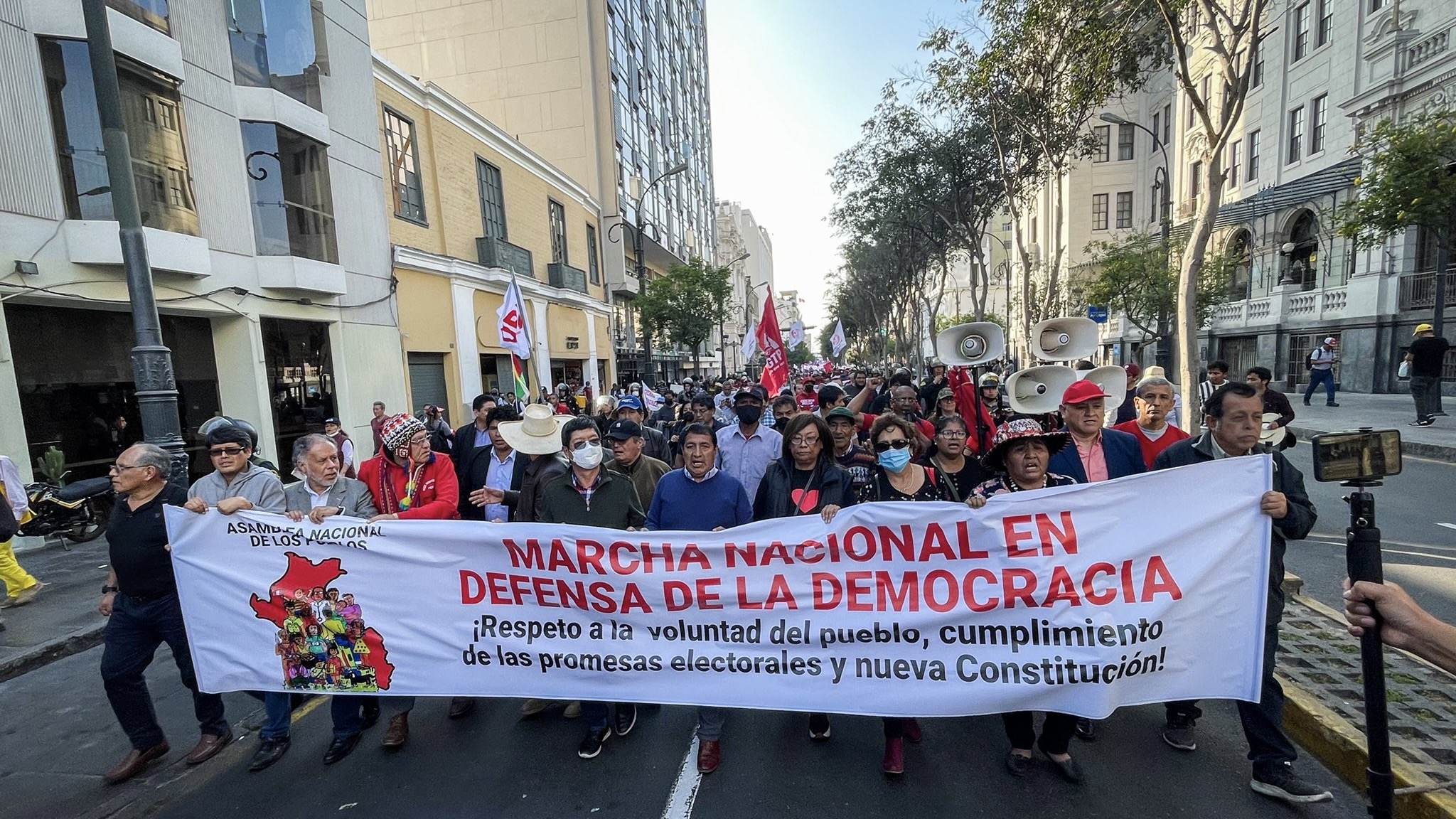Last week, tens of thousands of Peruvians took to the streets of the capital Lima in support of President Pedro Castillo. They rallied on Thursday November 10 against the third impeachment motion moved against him by the right-wing opposition, which holds a majority in the unicameral parliament.
Under the banner of “The Taking of Lima,” workers, students, peasants, and Indigenous people from different parts of the country came to the capital to condemn the repeated attempts by the country’s right-wing forces to remove President Castillo from power. They gathered at the San Martín Plaza and marched to the Congress of the Republic in defense of democracy, raising anti-coup slogans.
The protesters demanded that the president shut down Congress and call for fresh legislative elections. They also called on the president to fulfill his electoral promises of profound social and economic changes and take steps towards drafting a new constitution to replace the current neoliberal one, which was written and imposed during Alberto Fujimori’s dictatorship.
The citizens also demanded the resignation of Attorney General Patricia Benavides, who they alleged was colluding with the opposition. She had last month accused him of corruption and criminal organization. On October 12, Benavides filed a constitutional complaint with parliament, following which opposition parties began collecting signatures to seek a third impeachment motion against Castillo.
While the mass media had launched a provocative campaign which claimed they would be violent, the protesters marched peacefully. Police personnel were present on the route to the Congress and stopped them one block before the legislative palace. At the end of the mobilization, however, a small group of demonstrators clashed with the Police, who then repressed the march with tear gas.
The march was called for by the National People’s Assembly, a platform of political and social organizations and trade unions.
🚨#ATENCIÓN | El representante de la Central Única Nacional de #RondasCampesinas del Perú (Cunarc-P), Marino Flores, llegó a la marcha Toma de Lima luego de que el lunes se reuniera con el presidente Castillo en Palacio. En una reunión previa pidió el cierre del Congreso. pic.twitter.com/jMo3NuJKQS
— Vigilante (@VigilantePer) November 10, 2022
The mobilization took place a day after the president of Congress, José Williams, refused to hold a vote in a plenary session on a confidence motion presented by President Castillo on November 9. The motion sought approval for a constitutional reform aimed to guarantee the country’s political stability and generate favorable governance conditions. The bill repeals the legislation approved by the opposition majority that reduces the powers of the Executive (the President).
This confidence vote carries high stakes for both state powers. In the event that Congress denies this vote of confidence, the president’s entire cabinet would have to resign. But it would also allow the government to call for a second confidence vote, which if also rejected would empower the President to dissolve Congress and call for new legislative elections.
The left-wing government, led by President Castillo, and the opposition-controlled Congress have been at odds since they assumed office in July 2021.
Castillo had repeatedly condemned the refusal of the right-wing to accept his electoral victory, and has denounced parliament, the prosecutor’s office, and other public institutions for promoting destabilization attempts against his government, and trying to force him and his appointees out of power.
In the past 16 months in office, Castillo has had six investigations opened against him accusing him of alleged crimes of corruption, criminal organization, influence peddling, accomplice to collusion, personal concealment against the administration of justice, and plagiarism of his master’s thesis. He has also faced and survived two impeachment motions. He has been forced to reshuffle his cabinet three times, and has changed over six dozen ministers over disputes and disagreements with the Congress.





